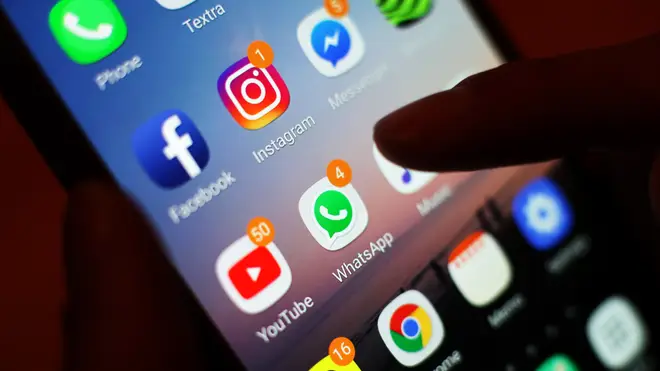
James O'Brien 10am - 1pm
2 April 2021, 00:04

A third of UK adults intend to use social media and personal messaging apps to encourage people to get vaccinated, according to an academic study.
There is a strong and “troubling” link between vaccine hesitancy and people planning to discourage others online from receiving a coronavirus jab, researchers have found.
A third of UK adults intend to use social media and personal messaging apps to encourage people to get vaccinated, according to a study involving five UK universities.
Most of the 5,114 UK adults questioned are undecided about how or if they will endorse the vaccines online – but one in 10 intend to use these platforms to discourage others.
The researchers found that the more respondents were hesitant about the vaccine, the more they intended to discourage others online from taking it, and the less they planned to encourage others.
The researchers put respondents into six groups, depending on how they used sources of news about coronavirus, such as TV, radio, newspapers, social media and messaging apps and Government/NHS websites.
They then looked at how these methods linked to vaccine hesitancy, belief in conspiracy theories and the “news-finds-me” perception – where people rely on their online networks to give them information.

Those who depended mainly on social media for their news and demonstrated a conspiracy mentality were most likely to intend to discourage others online from getting a jab.
“News avoiders” – people with well-below-average use of media sources – who also had a “news finds me” mentality, were also more likely to intend to discourage others.
And those who used all news sources above average were the most likely to say they would encourage others online to get the vaccine.
The paper is part of the Oxford Coronavirus Explanations, Attitudes, and Narratives (Oceans) project and involved the Universities of Oxford, Loughborough, Cambridge, Bristol and Birmingham.
The authors write: “Vaccine-hesitants’ views will circulate beyond interpersonal network ties and potentially shape the perceptions of others.
“That would have been less the case in the media system of even just a decade ago, when the opportunities to reach beyond immediate family and friend networks were more circumscribed.
“This new context makes this finding about the link between hesitancy and discouragement of others troubling.”
They warn that news avoidance may be a “serious challenge” to encouraging vaccine take-up.
Given this group will be hard to reach through traditional or digital media, the authors recommend direct contact, for example through the post, phone, local health services, workplaces and street advertising.
Professor Andrew Chadwick, from Loughborough University’s Online Civic Culture Centre, who led the research, said: “Avoiding news and having a ‘news-finds-me’ attitude is perhaps most troubling, because this combination of factors links with the online discouragement of others from taking the vaccine.
“In addition, the connections between conspiracy mentality, social media use, and online discouragement are likely to undermine the UK vaccination programme, to some extent.
“On a more optimistic note, our research shows that only a small minority of the UK public say they will go online to overtly discourage others from taking a Covid-19 vaccine.

“Public health communication based on direct contact and empowering people to share good quality information online could contribute to improved vaccine take-up.”
The researchers say it is “unrealistic” to expect those in the social media-dependent group to suddenly turn to TV and radio news.
They recommend a social media campaign that encourages users towards trustworthy sources such as NHS or public health websites.
But they warn that information-based messages targeted at social media could “backfire” when it comes to users with a conspiracy mentality.
They say: “It might lead to a backfire effect that further entrenches anti-vaccine beliefs and leads some social media users to become more assertive in their attempts to discourage others from taking a vaccine, while sharing existing anti-vax material as they do so.”
The study has been accepted for publication in the journal Social Media & Society.